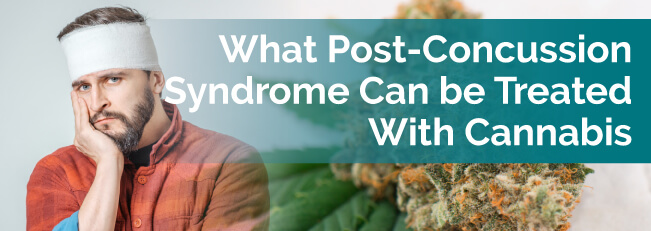
Post-concussion syndrome is somewhat clouded in mystery. We know it’s caused by a traumatic injury to the brain that results in a concussion, but we don’t understand why it develops or really what heals it. Why do some patients get the condition while others do not? Most of the time, it resolves after a matter of weeks or months.
Even a minor head injury can lead to post-concussion syndrome, while, oddly enough, more serious head injuries don’t typically develop the condition. As patients recover from this disorder, there are very limited treatment options doctors can offer. Pain medications can worsen the headaches associated with post-concussion syndrome, and other side effects are usually left to resolve themselves over time.
Post-concussion syndrome can take up to a year or more to go away, leaving patients to deal with symptoms like pain, insomnia and depression. With the advent of medical marijuana programs in states throughout the U.S., cannabis could be the key to treating these patients so their brains can naturally recover from trauma.
Trauma to the head can have a severe effect on the brain and nervous system. Even if there’s no visible sign of injury, shaking or jostling can damage the brain. A concussion may appear minor without any loss of consciousness, but post-concussion syndrome may still result.
Depending on the patient, symptoms have been known to affect a patient’s day-to-day life, lasting for days, weeks or months. Doctors look for at least three of the following to determine if a patient has post-concussion syndrome:
Medical science doesn’t entirely understand the physiology of post-concussion syndrome, so it’s difficult to apply a singular treatment plan. Tissue damage sustained by the brain needs time to heal. In the meantime, doctors treat the symptoms associated with the condition. Common treatment options include:
There’s no cure for post-concussion syndrome, and although many patients find some help with the above treatments, most are left to heal on their own. There’s not much doctors can do besides provide limited relief while the brain heals itself.
The main benefit of using medical marijuana to treat post-concussion syndrome is its ability to address many of the symptoms associated with the condition. Other options only treat one or two of the disorder’s effects. As we understand cannabis and how it interacts with our body’s chemistry, we see its incredible health benefits. Plus, it has very few side effects.
Patients with post-concussion syndrome have seen the following beneficial results by using medical marijuana:
If you’re considering medical marijuana treatments, our opinion shouldn’t replace that of a doctor or budtender. An expert can look at your exact circumstances and provide personalized care. Search our directory to find a doctor near you or a local medical marijuana dispensary.
For more information about how cannabis can be used to treat Post-Concussion Syndrome, check out our resources: